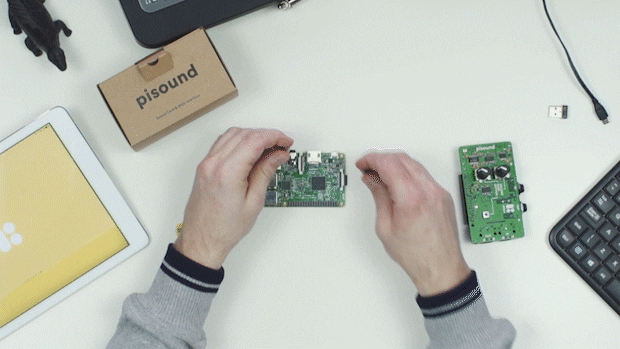Blokas has introduced pisound – an Audio & MIDI interface for the Raspberry Pi pocket computer platform.
The Raspberry Pi is an inexpensive (around US $40) barebones computer. Its low cost and tiny size make new types of computer projects feasible, and the pisound is designed to expand its reach into audio applications.
pisound is an ultra-low latency high-quality soundcard and MIDI interface, designed specifically for the Raspberry Pi. It is equipped with stereo input and output, with Gain and Volume controls, classic MIDI In and Out ports with activity LEDs, a user-customizable button and additional software that will turn the Raspberry Pi into a complete audio workstation.
pisound is compatible with virtually all Linux distributions and software and can be used in any audio-related project. Using pisound with the Raspberry Pi, you can make your own music instrument, audio effect, portable recording studio, Internet radio station or network enabled audio player.
The main feature that lets the pisound integrate with the Raspberry Pi in a powerful way, is its user-configurable button. By default, using the button you can open Pure Data patches straight from a USB thumb drive, close them, shut down the Raspberry Pi and even launch a “pisound” Wi-Fi hotspot, so that you can connect via SSH, VNC or send MIDI/OSC messages directly to your Raspberry Pi using smartphone or tablet.
Here’s the official intro video:
Pricing and Availability
pisound production is being funded via an Indiegogo crowdfunding campaign, launched on ‘pi day’. The project is already close to meeting its funding goal. The interface is available to project backers from €79/$84/£68.
via Pranciskus







Get a HIFIBerry card ($28) and a 1×1 port MIDISPORT USB MIDI Interface ($39) and you have more for less. Since 3.10.23, HiFiBerry DAC support is already included in the standard Raspberry Pi kernel sources. Is this just is taking an open source solution and make it proprietary for a high price ? Yes, this is small, but that’s all.
Open source/DIY vs. proprietary/ready-to-use is not a black and white situation. There’s a rich and vast span of solutions and products in between. What is a C++ library if not one of those in-betweens?
Isn’t this too?
/mx
You seemed to have missed that it also has analog input. HIFIBerry doesn’t, so it can’t be compared with.
There’s also PiCap from Bare Conductive, but it also doesn’t have audio input, only output. It is also meant to make instrument out of.
Good point, and indeed there aren’t much products like this. But no matter this product is great, if the creators cannot clearly state this does not infringe om terms (i.e open source terms or copyrights etc..) it should be taken off Indigogo. I am not sure if such crowdsourcing sites have a terms and conditions sellers need to obey to. If not, that should be something that needs to happen.Equally, on the comment below several folks SELL software based on JUCE (or CTRLR based on JUCE) from who it’s doubtful they paid the commercial JUCE license as well to ROLI. Respecting license terms is something DIY’ers forget about or not really understand.
Q, why do you claim we are infringing someone’s copyright terms? In fact, we have released the source code on GitHub using GPLv2 for both the pisound’s kernel module as well as The Button daemon source code:
https://github.com/raspberrypi/linux/blob/rpi-4.9.y/sound/soc/bcm/pisound.c
https://github.com/BlokasLabs/pisound
Hey, the pisound’s kernel module is open source and is integrated in the Raspberry’s Linux kernel: https://github.com/raspberrypi/linux/blob/rpi-4.9.y/sound/soc/bcm/pisound.c
As other guys have noted, you get a complete solution with high quality input and output, DIN-5 MIDI input and output, and a button which enables making use of this setup without a display, keyboard or mouse. This is what sets it apart from output-only audio HATs.
I think this is great. The JUCE C++ Audio library (which many plug-ins are written with) already supports Linux, so it should be very easy to develop plug-ins for the platform.
wonder what the pi4 will be like?
The raspberry pi has certainty been causing some change
and all you have to do is search “SBC” small board computer to really get your mind blown.
there is also orange pi, and banana pi (HMM) and because of the high cost of the pi the “Chip computer,aka 9 buck computer” as well as countless boards claiming to compete with the PI
AND there all the things that can be done with the PI, media servers, web servers, robotics, security, minecraft (look it up) kodi, retro gaming, windows 10 IOT (free to get) ,, and on and on
The funniest thing is the spin off that are going on the most interesting I found was a wi-fi board (EPS8266) originally made to get wifi to the Pi and other SBC has now become it’s own hack-able idea this
Could this be the basis of an open Euro module?
I’d love to see more software modules that you can customize, or a module that you could load Audulus patches onto.
I´m still not sure what to do with my pi3, but this seems not be my solution … customisation of pots, buttons, touch panels and faders would be more impressive to maybe do a customized synth, fx, controller or whatever ….
nice boxing is also missing i wouldn´t use it on stage with this look … the idea is great and will maybe help to invent some useful audio gear in the future …
Hey, you can treat Raspberry Pi + pisound as the ‘heart’ of your device. You could easily build a custom USB MIDI controller (or one that uses DIN-5 MIDI ports) to wire additional controls to your instruments’ interface that could be used by software running on Raspberry Pi. For example, to add a couple of pots and buttons this way, see here: https://github.com/BlokasLabs/usbmidi/tree/master/arduino/libraries/usbmidi/examples/midictrl
What are the technical specifications of this ?
– sample rates, bit-depths … ??
Hey, you can find the detailed specifications here: http://blokas.io/pisound/docs/specs/